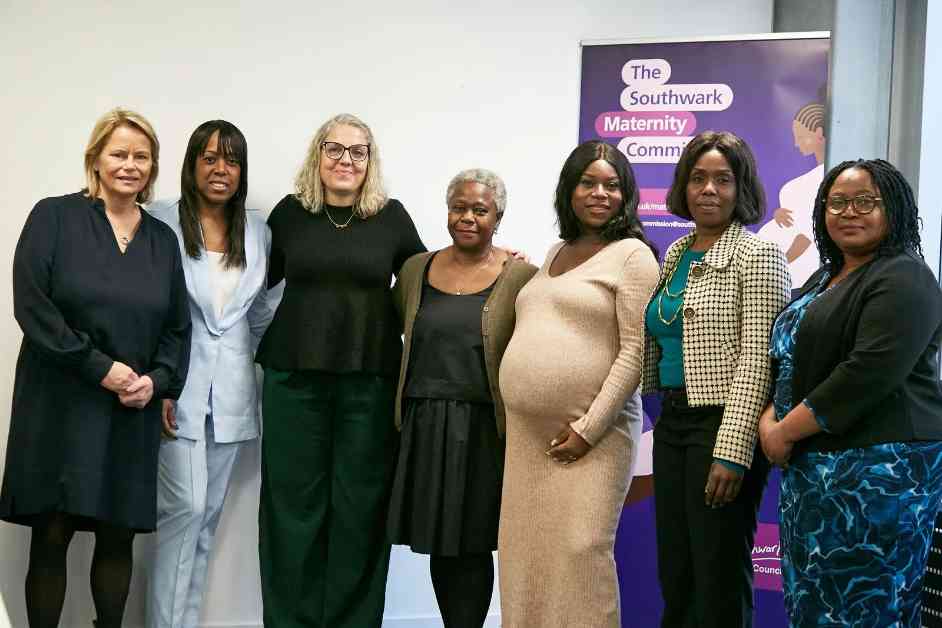Southwark council has recently revealed a comprehensive plan aimed at addressing the stark inequalities in maternity care experienced by black, Asian, and minority ethnic women in the borough. This initiative comes after a nine-month investigation uncovered alarming disparities in maternity outcomes, particularly for women from diverse ethnic backgrounds.
The establishment of the Southwark Maternity Commission in January was prompted by a national report that highlighted the concerning statistic that women from black ethnic groups were four times more likely to die in pregnancy compared to their white counterparts, with women from Asian ethnic backgrounds facing almost double the risk. This revelation underscored the urgent need for targeted interventions to improve the quality of maternity care for these vulnerable populations.
Co-chaired by councillor Evelyn Akoto, Cabinet Member for Health and Wellbeing, and professor Dame Donna Kinnair, the Southwark Maternity Commission recently released its final report, shedding light on the challenges faced by minority ethnic women during pregnancy and childbirth. Cllr Akoto shared her personal experience of a traumatic childbirth fifteen years ago, emphasizing the critical role of supportive and consistent maternity care in ensuring a positive birthing experience.
Despite the UK’s reputation as a safe place to give birth, the report unveiled disturbing disparities in outcomes for Black and Brown women compared to their White counterparts. The Commission gathered feedback from over 750 Southwark women, families, and healthcare professionals, revealing a pattern of negative experiences among black or black British respondents. Many women expressed feeling disregarded or sidelined by healthcare providers, while fathers and male carers voiced frustration at being excluded from important discussions and decisions.
Instances of women receiving interventions without adequate explanation, such as emergency cesarean sections and prolonged observation, were reported, further highlighting the communication breakdown between healthcare providers and patients. Shockingly, some women recounted having their symptoms dismissed by maternity staff and general practitioners, leading to devastating consequences like miscarriages occurring in isolation due to ignored labor pains.
In response to these distressing findings, the council has put forth ten recommendations as part of a five-year plan to address the systemic issues plaguing maternity care in the borough. These recommendations include urging the Government to implement policies combating racism and inequalities in maternity care, establishing a framework for collecting and analyzing maternal health data with a focus on ethnicity, and reviewing maternity staff pay and working conditions within the NHS.
Jacqui Kempen, head of maternity NHS South East London Local Maternity and Neonatal System, commended the report’s release, acknowledging the ongoing work required to enhance maternity services in the region. She emphasized the collective commitment of maternity and neonatal services across South-east London to collaborate with communities, partners, and advocacy groups in delivering improved experiences and outcomes for mothers and babies.
To monitor the progress of the Commission’s recommendations, a strategic steering group will be formed comprising representatives from the council, healthcare institutions like Guy’s and St Thomas’, King’s College Hospital, and South London and Maudsley, as well as voluntary organizations and maternity health advocates. This collaborative effort aims to ensure accountability and sustained improvement in maternity care services.
The Department of Health and Social Care pledged to address the glaring maternal mortality gap affecting Black and Asian women, emphasizing the government’s commitment to providing safe, personalized, and compassionate care for all expectant mothers. Trusts identified as underperforming in maternity care will receive support to expedite necessary improvements, while additional training will be provided to thousands of midwives to enhance support for women throughout their pregnancy journey.
In conclusion, the unveiling of Southwark council’s plan to tackle stark inequalities in maternity care represents a critical step towards ensuring equitable and high-quality healthcare services for all women, regardless of their ethnic background. By implementing the Commission’s recommendations and fostering collaboration between stakeholders, the council aims to address the systemic issues that have perpetuated disparities in maternity outcomes, ultimately striving towards a future where every mother receives the care and support she deserves during pregnancy and childbirth.












